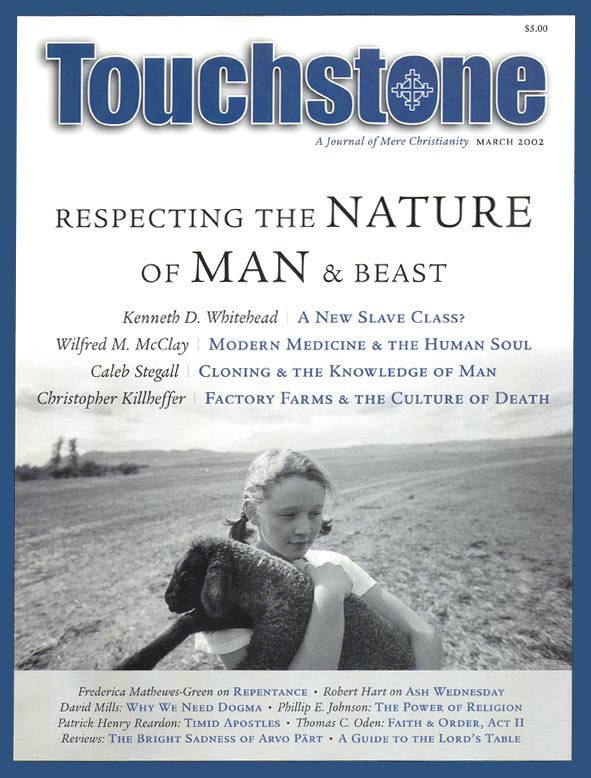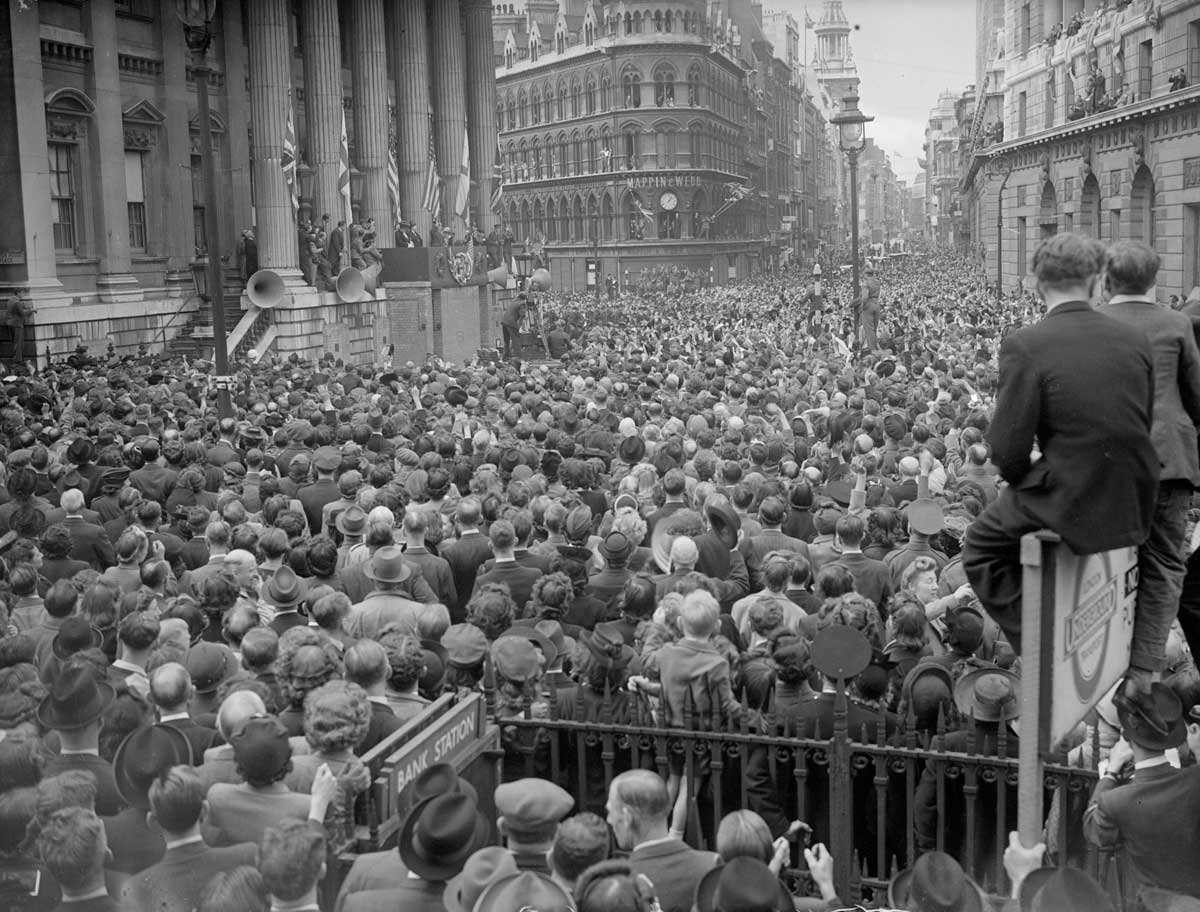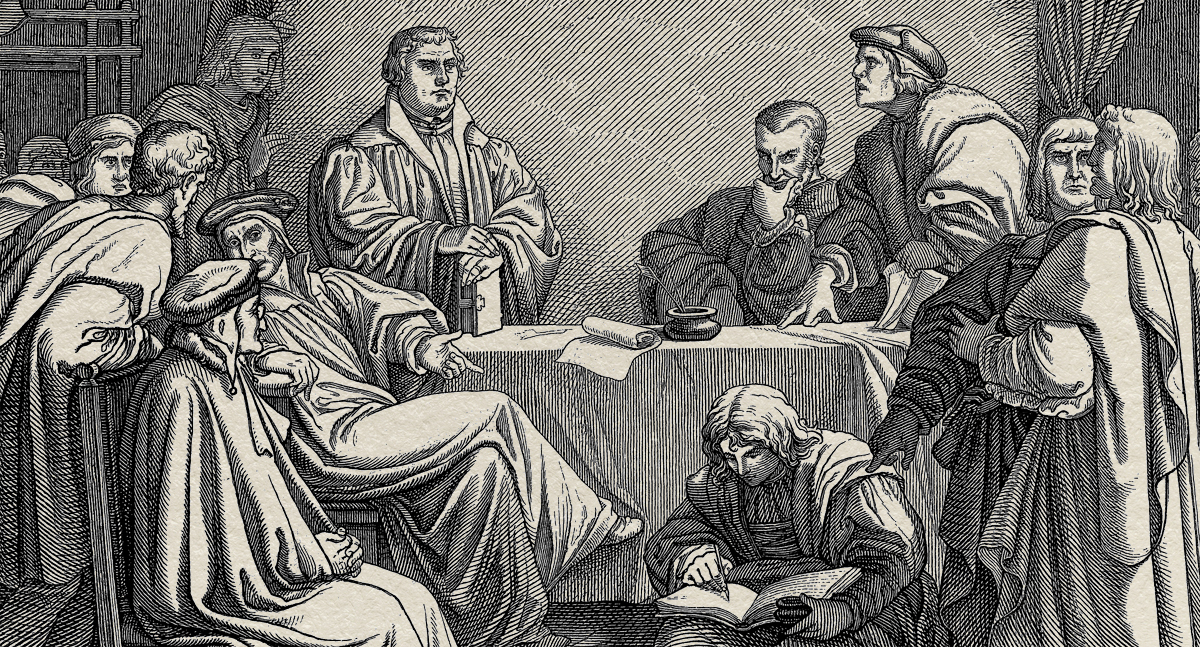Timid Apostles
It is obvious that this past September 11 has done wonders among Americans by way of making us friendlier to one another, more patient in discourse and behavior, more mutually tolerant. In general, surely, such developments are very much to our good as a nation, for we doubtless needed improvement in all these matters.
In one particular, however, we at Touchstone suggest that this current politeness is getting entirely out of hand. That particular is religion. It appears to us that religious expression in our country right now is often constrained by an artificial and improper modesty, probably spawned by some sense that we Americans must not draw attention to the deep religious differences that divide us. This impulse, which we think neither honest nor healthy, is expressed in two ways that affect the present religious climate, to the detriment, we fear, of the Christian witness itself.
First, on the part of many Christian spokesmen there is a discernible pattern of cultivated silence about the unique claims of the gospel. Apparently reluctant to offend non-Christians, some of our church leaders seem muted and paralyzed by a terminal politeness. In recent tragic situations that simply cry out for the light of the holy Cross, the public silence about Jesus the Savior has been almost total. Evidently afraid of giving offense, Christians in large part are not speaking up to bear witness to the only name under heaven given men by which we must be saved. Let it be said that this fear is very dangerous, for we know the final fortune of those ashamed to confess Jesus before men.
Consider, for instance, the numerous occasions of public prayer in these trying times. Although we Christians have no biblically conferred warrant to address any God except the Father of our Lord Jesus Christ, we have been watching a seemingly endless series of timid Christian clergymen, including mainline Protestant pastors, Eastern Orthodox bishops, and Roman Catholic cardinals, solemnly parade up to the interfaith podium, only to sound very much like rabbis, imams, or shamans. Void of recognizable confessional content, and sometimes hardly more than bland, platitudinous chatter, these exercises in syncretism are hopelessly vague and theologically indistinguishable.
The resulting potpourri is not American pluralism, because real pluralism requires real differences. Is it not ironical, in this age of aggressively cultivated pluralism, that such great efforts are made by ordained Christian leaders to remove all vestige of “difference” in the way they talk to God? Christians have been given a special mode of prayer purchased for us by the One who bore our sins in his flesh upon the Cross, and it is discouraging to watch our clergymen, as they stand up in front of international television cameras, act as though they know nothing about it. Let us be clear on this point of theology, for it is a serious matter of principle: We have no true access to the fatherhood of God except through the sonship of Christ. We Christians have no right to call God “Father” except by the confession of Jesus as his Son. “Whoever denies the Son, does not have the Father” (1 John 2:23).
We are not certain when Christian clergymen began this evisceration of confessional content from prayers offered in interfaith contexts, but the offense seems to be recent. We recall the presidential inauguration of John F. Kennedy in January of 1961 and remember that both of the first two clergymen who prayed that day, Cardinal Cushing of Boston and Archbishop Iakovos of New York, began with, “In the name of the Father, and of the Son, and of the Holy Spirit.” Nor, fortunately, has the more recent silence on this theme been absolutely total. Indeed, we go on record here to thank Franklin Graham and those other faithful pastors who continue to buck this syncretistic trend, boldly proclaiming their Christ-centered faith by actually praying in the only name by which we have access to the true God.
Second, there is a discernible pattern, on the part of some Christian leaders, of speaking rank nonsense and plain rot when mentioning other peoples’ religions. To provide an excellent specimen of this widespread problem, we have determined, after years of tight adherence to a policy of not remarking on items in our No Comment column, that the time has arrived to give ourselves some slack. However stricken our conscience for this indulgence, we find the following example simply too perfect to leave unmentioned.
Bishop John J. Nevins of the Catholic Diocese of Venice in Florida, in an open letter that appeared as a full-page ad in the Naples Daily News and some half-dozen other Florida newspapers this past December 24, sent Christmas greetings to all the people who live in the ten counties that he pastors. While such seasonal greetings from church leaders are normal in diocesan journals and similar judicatory publications, it is less common to find them in secular newspapers, but this is the third year that Bishop Nevins reached a much larger circulation in this way. Otherwise, his message would not be read by the Jews, Moslems, Buddhists, and Hindus whom he explicitly addresses. The man’s dedication to ecumenism is obvious.
Now, we are persuaded that Bishop Nevins, by such an expression of respect and solidarity, may be taken as the very model of someone going that extra mile to prove himself a good American. In addition, we are confident that the bishop thus acts for motives genuinely charitable, sincere, and beyond inpugnment. Moreover, if we adduce his Christmas letter as our single example of an attitude we find profoundly offensive, it is solely for the purpose of brevity, for another hundred examples lie readily at hand.
Thus prefaced, here is our objection. Some of what Bishop Nevins says with respect to non-Christian religions is pure cant and compromise. For example, when he speaks of “the Divine, known by many names,” there prevails in the mind a general impression that these names are all pretty much equal, or that the differences separating them are only matters of measure and degree. There appears a clear intent on the bishop’s part to darken the radical, formal difference that the name of Jesus makes in man’s religious history. (Indeed, the name “Jesus” does not appear anywhere on the page.)
The bishop’s unjustified diffidence on this point, his very muted witness, would be bad enough, but quickly things get worse. A few lines after mentioning the Prince of Peace (or rather, “the one whom we call the Prince of Peace”), Bishop Nevins goes on to refer to Mohammed as “the prophet of peace.” Now had the bishop called Mohammed only a prophet of peace, it would already be an incredible pronouncement about the individual whose religious career launched the most extensive military conquest in all of history. After Mohammed’s capture of Mecca, his immediate followers rapidly went on to seize the rest of the Arabian peninsula, the entire Fertile Crescent and the Persian Empire, Egypt and all of North Africa, and, crossing the straits of Gibraltar, the whole Iberian peninsula. “The prophet of peace”? Heaven spare us a prophet of war. Not until 732, exactly one century after Mohammed’s death, was the western theater of that massive invasion halted in Gaul by the Frankish forces under Charles Martel. The remnants of the Byzantine Empire fell to Moslems in 1453, and were it not for the intervention of John III Sobieski of Poland at the siege of Vienna in 1683, who knows what would have befallen the rest of Europe?
Patrick Henry Reardon is pastor emeritus of All Saints Antiochian Orthodox Church in Chicago, Illinois, and the author of numerous books, including, most recently, Out of Step with God: Orthodox Christian Reflections on the Book of Numbers (Ancient Faith Publishing, 2019).
subscription options
Order
Print/Online Subscription

Get six issues (one year) of Touchstone PLUS full online access including pdf downloads for only $39.95. That's only $3.34 per month!
Order
Online Only
Subscription

Get a one-year full-access subscription to the Touchstone online archives for only $19.95. That's only $1.66 per month!
bulk subscriptions
Order Touchstone subscriptions in bulk and save $10 per sub! Each subscription includes 6 issues of Touchstone plus full online access to touchstonemag.com—including archives, videos, and pdf downloads of recent issues for only $29.95 each! Great for churches or study groups.
Transactions will be processed on a secure server.
more from the online archives
calling all readers
Please Donate
"There are magazines worth reading but few worth saving . . . Touchstone is just such a magazine."
—Alice von Hildebrand
"Here we do not concede one square millimeter of territory to falsehood, folly, contemporary sentimentality, or fashion. We speak the truth, and let God be our judge. . . . Touchstone is the one committedly Christian conservative journal."
—Anthony Esolen, Touchstone senior editor










